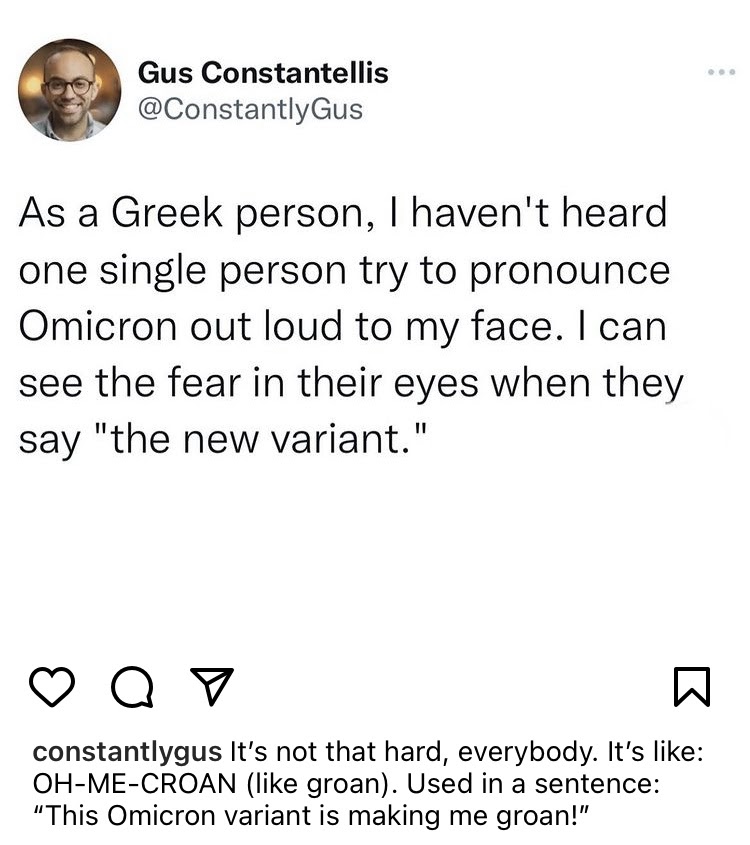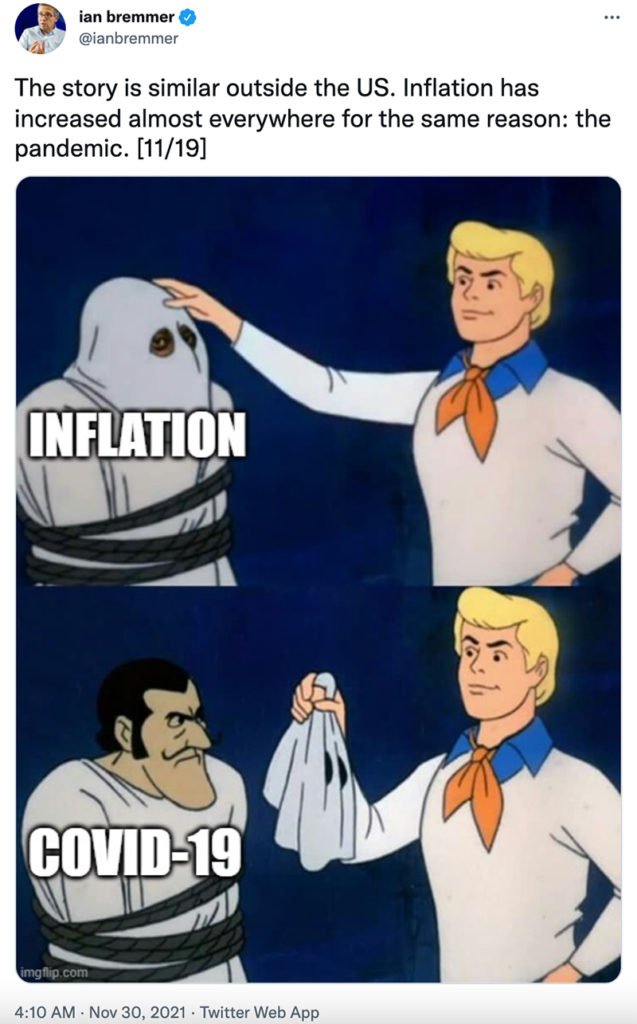Volcanoes are erupting in The Philippines, but on-fire Australia received some welcome rain. The Iran war cries have been called off and The Donald’s military powers are about to be hamstrung by the Senate. Meanwhile, his impeachment trial is starting, and we’re all on Twitter for a front-row seat.
What Could Go Right? “Not the Andromeda Strain”
Omicron, inflation, and the Great Barrier Reef is reborn
This is our weekly newsletter, What Could Go Right? Sign up here to receive it in your inbox every Thursday at 6am ET. You can read past issues here.
Remember how nice it was when the only thing we had to freak out about was inflation? It’s just like that blasted coronavirus to pop up with a “variant of concern” right on time to ruin our festive holiday mood.
“We still don’t know enough about the Omicron variant to panic,” ran a headline from MIT Technology Review this week, as if there may come a point in the near future where it would make absolute sense to panic. (Headline aside, the article itself is fine.) We all remember too well the fear that accompanied the early days of the pandemic, the loneliness and stress that came with the lockdowns, the massive adjustment and upheaval of it all that continues on presently. Those bad memories reawaken and can overtake us when news appears as it did last Friday about a new variant. Suddenly, we’re right back to two years ago.
But our mental state and reality are two different things. Omicron will not actually send us back two years in time. As University of Cambridge’s Dr. Raghib Ali wrote on Twitter last week, some of the headlines and commentary about the new variant “are really not helping people’s (already fragile) mental health. Of course we should take it seriously, but there is no plausible scenario that this variant is going to take us back to square one (ie. the situation pre-vaccines).”
Or as Dr. Peter Hotez, co-director of the Texas Children’s Center for Vaccine Development, said on CNN, “The sky is not falling. . . . This is not ‘The Andromeda Strain.’” The World Health Organization (WHO) wants us to keep our heads, too. Here’s WHO epidemiologist Michael Ryan: “There’s this idea that we’re just waiting for the next variant, and I don’t want people to spend their lives worrying about that every day.”
Why not? Because our situation has changed mightily from when the pandemic first began, and many of those gains cannot so easily be reversed. There are now systems in place for monitoring new mutations, and they move faster and faster. Once the Delta variant was identified last December, it took about six months for the WHO to classify it as a variant of concern, which meant that it had lots of time to circulate around before the world took notice. With Omicron, the classification took two days. And while we might not feel particularly thankful for news at the moment, our hyper-speedy, global media grants almost immediate access to information—good information, if we’re looking in the right places—which means we can make timely personal health decisions for the better.
There are now vaccines. BioNTech’s founder is optimistic that Pfizer-BioNTech’s current vaccine will continue to stop severe disease and death in spite of Omicron. Moderna’s CEO is less so, but even if it turns out that we need a new vaccine formulation, guess what—we’re going to have one, soon. Both Pfizer and Moderna have already started on meeting their promises to have bespoke Omicron boosters ready to go in 100 days. This is how fast they are moving: Omicron was first reported by South Africa on November 24. Pfizer had made a DNA template, the first step in developing an Omicron-specific shot, by November 26.
There are now tests, which still work, even with Omicron. And there are treatment pills from Merck and Pfizer, which, again, we expect to still work.
Although we feel it’s unlikely we’re going to be mosh-pitting our neighbors to nab the last package of toilet paper again anytime soon, of course we won’t be able to gauge what is coming next until we have the answers to the top three questions about Omicron: if it is more transmissible, if it causes more severe disease, and if it evades the vaccines. We have to wait for reliable data on those. We know it is not easy to sit in uncertainty, but sit we must. If you really can’t sit, there are plenty of (competent) people out there, including The Progress Network (TPN) Member Nicholas Christakis, having an early whack at the answers.
As we sit and wait, stay vigilant, but also do as health journalist David L. Katz advises. “I recommend keeping an ear to the news, but adjust your dial to filter out the drama,” he wrote in a piece about whether Omicron may turn out to be a more mild version of Covid-19. “Keep calm, carry on . . . and renounce the noise.”
Or, for some levity, you can practice your pronunciation. How do you even say “omicron”? The BBC, WHO, and classicists disagree, but if we’re going to ask a Greek:

Inflation is still a thing
Except maybe not as much of a thing as it seems. In TIME, TPN founder Zachary Karabell reminds us that “some inflation is not the same as scary, runaway hyperinflation that will destabilize the financial system and reduce the living standards of wage earners.” There are many reasons, one being that we’re coming off the deeply depressed Covid economy, to expect we are in the former and not the latter.
TPN Member Ian Bremmer also took a look at inflation in his newsletter, writing that this time around, those who traditionally suffer most under inflation—the poor—are actually weathering it well, due to rising wages that have kept apace with inflation and a strong labor market. Despite inflation, “a majority of Americans are economically better off today than before the pandemic,” Bremmer writes. If you’d rather read the Twitter thread version of this article, complete with memes, it’s here.

Before we go, the Great Barrier Reef is reborn
It’s not all over for Australia’s Great Barrier Reef, which is recovering from “life-threatening coral bleaching” due to warm ocean temperatures the last few years. On Tuesday, the corals started to spawn again, “fertilizing billions of offspring” in an “explosion of color.”
Below in the links section, Portugal shuts down its last coal plant ahead of schedule, Barbados says goodbye to the Queen, and more.
From us: Recently we were at Web Summit, a conference that brought together 30,000+ people and startups of all sizes. While we were there, we sat down to talk with a few people for the podcast whose companies and work are trying to make the future better.
Part 1: Our first conversation is with Donnel Baird, the founder of BlocPower, an NYC-based company that “turns buildings into Teslas.” BlockPower retrofits residential buildings to wean them off dirty energy and make them green. The second is with Bobby Healy, the founder of Manna, a drone delivery company in Ireland that is replacing gas-guzzling delivery trucks, boosting local business, and making lives much more convenient. Listen here.
Part 2: First, we talk with Sonia Jorge, Executive Director for Alliance for Affordable Internet and Head of Digital Inclusion Program at Web Foundation, to hear how they are creating the conditions for affordable Internet in countries worldwide and what they have learned along the way. Next, we sit down with Robert Barrow, the CEO of MindMed, a company that researches and develops psychedelic-inspired medicine, about what they see as the future of mental illness and addiction treatment. Listen here.
Progress, Please
(Found good news? Tweet at us @progressntwrk or email.)
Other good stuff in the news
United States:
- A new stem-cell treatment looks to have cured a man of Type 1 diabetes | The New York Times
- US jobless claims hit a 52-year low after seasonal adjustments | AP
- Coming soon? Roads that recharge electric cars | The New York Times
- Developers are revitalizing Black neighborhoods by preserving their history | The New York Times
- New Jersey banned the sale of animal-tested cosmetics, joining seven other states | Cosmetics Business
- An Indiana city’s 140 roundabouts are saving lives, reducing injuries, and lowering carbon emissions | The New York Times
- One of New York City’s dirtiest freeways could be turned into green space, thanks to new federal funding | The Guardian
International:
- Barbados is leaving its colonial past behind | France 24
- This cheap device could expand the world’s access to vaccines | Scientific American
- Thousands of miscarriages a year could be prevented after a hormone drug was approved in the UK | ITV
- Portugal shut down its last remaining coal plant, long before the deadline | CNN
- Germany’s incoming government wants to end coal use by 2030, eight years earlier than previously planned | Engadget
- Be reassured: the world is not as divided as we might think | The Guardian
- Over half a million refugees will get the right to work under a new law in Kenya | VOA
- The UK is banning cosmetic surgery ads aimed at under-18s | The Guardian
TPN Member originals ![]()
- Practicing gratitude: How to be thankful when you don’t feel thankful | Arthur C. Brooks
- Why the cost of higher education has spiraled out of control | Scott Galloway
- What Vladimir Putin is up to in Ukraine | Ian Bremmer
- Putting your corporate purpose to work | Hubert Joly
- America should invest in its federal legislature | Matthew Yglesias
- The new Covid variant has a few unkind words for the world’s governing class—and for global elites more broadly | Robert Wright
- Building back a better vice presidency | Lauren Leader and Mark K. Updegrove
Immerse yourself in our long list of the week’s progress links.
Upcoming Events
- FountainHead RI: Fireside Chat | Hubert Joly | December 8
New Member Alert

Andrew Yang is an entrepreneur, author, philanthropist, nonprofit leader, and former 2020 presidential candidate. Andrew has seen first-hand what’s preventing our country from getting things done, and he is now directing his energies towards fixing the machinery of our stagnant democracy. In his book Forward: Notes on the Future of Our Democracy, Andrew lays out the case for a variety of democracy reform measures that can unclog the pipes of our system and realign the incentives of legislators with the wellbeing of the American people. He also announces the formation of the Forward Party, a new political organization that’s building a movement around these ideas and helping to elect politicians who are willing to work together to solve the big problems facing this country.
Listen to Andrew talk about solutions for moving the US forward.
Until Next Time
It’s not too late to reclaim your long weekend feels. 👇


